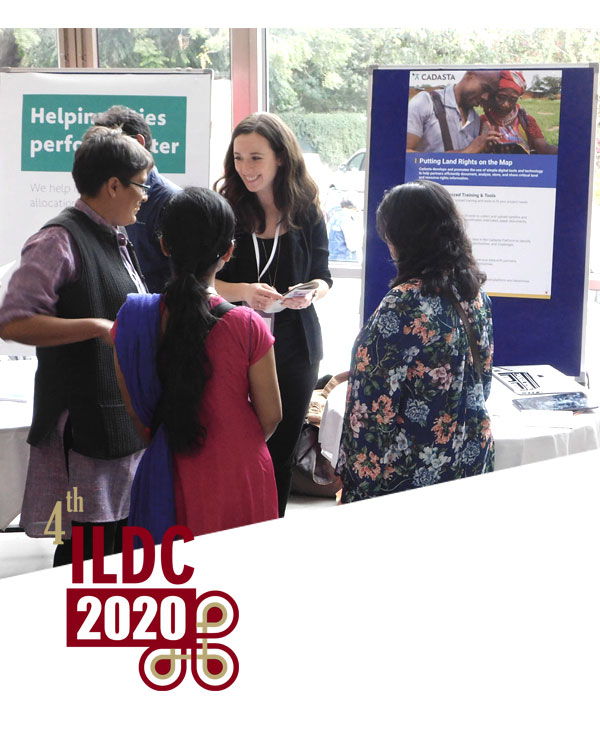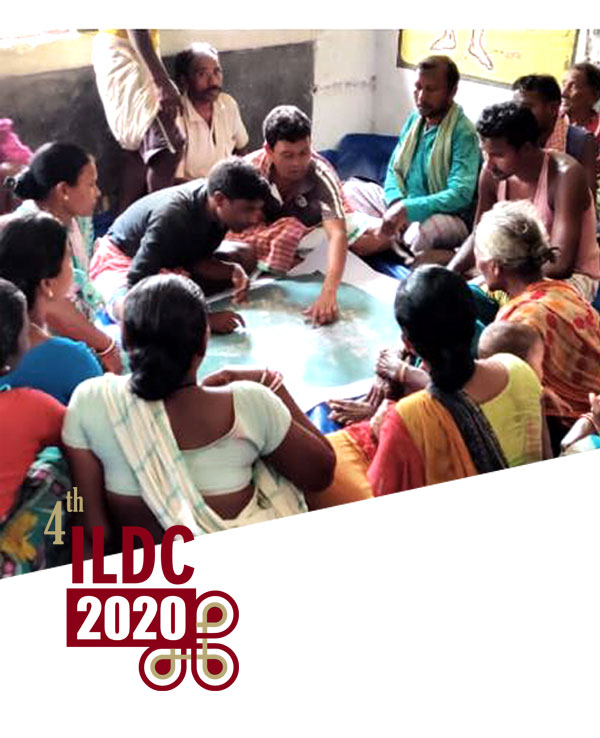
Themes and Threads
Like last years, ILDC2020 will provide platforms for enriching and interdisciplinary conversations in form of sessions for presentations, panel discussions, round tables as well as avenues like master classes, lightening talks and focussed conclaves. Following this year’s theme, presentations and conversations on if and how ‘Institutions, Innovations and Information’ matter for, influence and impact land governance in India are invited.
Furthering inclusion has been an agenda of ILDC and how diverse tenure regimes around different land uses influence land rights of marginalized groups, will be preferred for deliberation this year.
Of particular interest to this year’s conference is also the assessment of status, preparedness and pathways with respect to land agenda included in the UN’s Sustainable Development Goals.
ILDC as a platform seeks to trigger intensification and diversification of meaningful and strategic land engagements by land actors within and across pillars of Samaj, Sarkar, and Bazaar and therefore experiences, cases, reviews and debates on how these stakeholders interact among and with each other to engage with land tenure security are welcome.
Technology and disruptions are increasingly viewed as game changers with transformative potentials and slowly but steadily there influence is being felt in the land engagements and discourses; ILDC2020 encourages conversations on relevant ideas, pilots, good practices and failures.
Private sector Influence on land is now substantive and transcends across land uses and tenures with ambition for growth and attention for sustainability, both steadfastly increasing. While conflicts, alienation and exclusion often attributed to it, sporadic examples around land responsible-investments and innovative win-win engagements have started upcoming. ILDC 2020, seeks to expand private sector interactions, particularly around cases and willingness related responsible-investment, technology innovation not only as CSR and R&R, but also as a core strategy of corporate governance, underlining the criticality of land as key investment crucible.
Cultural and artistic expressions around land has been part of our culture, literature, dance forms, films and storey telling. Along with intellectual deliberations, political discourses and social narratives, they subtly yet substantially influenc and impact land awareness, engagements and trigger changes. This ILDC onwards, we provision space for sharing and display of such expressions as a lighter yet impactful medium of communicating land.
ILDC2020 will have following cross-cutting threads, which the submissions/presentations/ deliberations should ideally address, while focusing on this year’s theme of institution, innovation and information.

1. Inclusion : Inclusive Land Tenure Security
Inclusive Land Tenure Security is the goal for land right actors and land tenure professionals. This is key to sustainable and equitable development. Proposals/submissions are invited on inquiries, investigations and analysis of land tenure of these marginal group across land-uses viz. agriculture, homestead, forest, pasture, coastal, urban and common lands
- Women Land Rights: Influence and impact of Legal-institutional reforms and innovations on gender equity in practice and in terms of monitorable data and the potential options and pathways to ensure SDG 51 a and b
- Tribal and Indigenous Land Rights: Provisions of legal pluralism, constitutional safeguards, special protections for customary and community tenure vis-à-vis tenure security, cultural identity and livelihoods of indigenous and tribal communities in Schedule V, VI and other tribal dominant areas, as aspirations and agenda for growth and development enter these resource-rich areas
- Land rights of Dalits: landlessness, tenancy, access to commons, recognition of forest rights
- Rights of tenant and small farmers, fishers and pastoralists in the context of doubling farm income, rights of farmers, access to public service entitlements and benefits from FPOs and value chain interventions
- Rights of slum dwellers, squatters/pavement dwellers and inhabitants of informal settlements, urban tenants in the context of fast urbanization, smart cities, affordable housing, regularization of informal settlements, individualization of group tenures as well as rights of slum dwellers.

2. Interactions : Sarkar (Government), Bazaar (Market) and Samaj (Society) and Zameen (Land)
Land relations are dynamic and have evolved and shaped through interaction with society, government and market. Submissions under this thread are expected to look at how state, civil society and market interacts with and change land tenure and if and how these interactions can improve land tenure security
- Land Laws, Administration and Reforms :
- Land leasing reform, consolidation: Arguments for and against leasing reforms, experiences from the pioneering states, lessons, good practices
- Land Record Reforms : Achievements and learning from State led reform around DILRMP and conclusive titling, sporadic non-state innovations
- Forest Rights Reforms : experiences and learning around implementation, role and contribution of stakeholders
- Urban land and housing reforms : State innovations around slum dwellers’ right, affordable housing, addressing informalities
- Decentralization and localization of land governance
- Land laws and legal reforms
- Land administration and institutional reforms
- Land and investments
- Land Acquisition, resettlement and rehabilitation : Experiences around mining, power, infrastructure, real estate; land banks, SEZs,
- Responsible and Sustainable Land Investments : Cases, experiences and attempts by public sector, linear infrastructure, private sectors, civil society; Land engagements as part of CSR, R&R and Corporate Governance
- Land and Civil Society
- Land as a discipline/inter-discipline in academia : Universities, B-Schools
- Land Rights actions and advocacy : NGOs and Networks
- Media and land rights reporting
- Land in literature and art forms
- Land, Technology and Social Entrepreneurs
- Geo-spatial Technology innovations, actors and partnerships around land
- Scopes and experiences around use of Block Chain technology in land administration
- Use of AI and Machine learning in land administration
- Big Data and Data analytics in monitoring and reporting land tenure and rights
